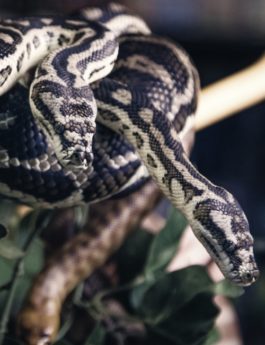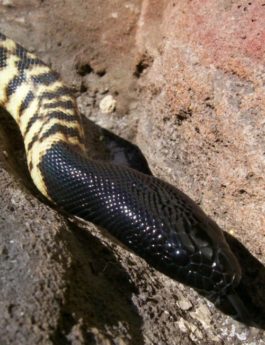The Rough-scaled Python is a slender snake with a head that is quite distinct from its neck, it is the only known python species with keeled scales. The body is a pale brownish white with coarse variegations, the lips are a creamy white.
Rough-scaled Pythons have been found in monsoon forest in sandstone gorges of the Kimberly region of north-western Australia.
Terrarium: Rough-scaled Pythons are an arboreal snake that can grow to a large size, with very few in captivity, the enclosure needs to be large enough to provide horizontal logs to bask themselves on, multiple hide rocks and maintain a thermal gradient. A terrarium that is 900x60x120cm (WxDxH) would be suitable to house a mature Rough-scaled Python, for a pair of Mature Rough-scaled Pythons 120x60x120 would provide an enclosure with adequate room for both snakes.
Lighting & heating: UVB lighting is not essential to Rough-scaled Pythons, however a low 2.0 spectrum fluorescent globe can be used for viewing purposes. Heating can be provided with a heat tile, mat or cord to maintain a ground surface temperature of 32°C in the hot spot. Ambient heat can be provided with an infrared heat globe to maintain a daytime temperature of 36°C in the warm end and 25°C in the cool end, on warmer days you may not need to turn on the heat globe as the ambient temperature of the enclosure may already be high enough. A thermometer should always be used to monitor the temperature within the enclosure.
Furnishings: It is important to provide your Rough-scaled Python with a large enough of hide cave, a water bowl at the cool end, and artificial plants will give coverage and decoration. Large horizontal Logs and vines can be used within the enclosure to provide climbing enrichment. A pet bedding wood chips such as Chipsi or Critter Crumble can be used as a substrate.
Food in captivity: All snakes in captivity must be fed dead food. A Rough-scaled Python will eat a variety of frozen and thawed mice, rats and chickens of appropriate sizes. On average they will have 1-2 food items every 7-10 days.
The essentials:
- Terrarium of appropriate size
- Tummy heating
- Thermometer
- Infrared Heat globe
- Water bowl
- Substrate
- Hide caves
- Foliage for shelter
- Large logs





